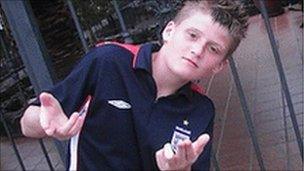Facebook bullying suicide boy's parents in law change call
- Published
The parents of a 15-year-old boy who hanged himself after being threatened online have called for a new law to specifically target bullying.
Thomas Mullaney, from Bournville, in Birmingham, died in May 2010 after being threatened on Facebook.
His parents Robert and Tracy say sites like Facebook need to do more to protect young people.
But a spokeswoman for Facebook said the site already had safety measures and strong links to anti-bullying groups.
Robert Mullaney said he would always be haunted by the memory of finding his son's body in their garden.
He said although Thomas had been in trouble with police in the past, he had been working hard to turn his life around and had a lot to live for.
"Thomas was a bright lad. They called him a loveable rogue. He wasn't all sweetness and light," he said.
"He did get into a lot of trouble but he was coming out of it."

Tom Mullaney, 15, hanged himself after being threatened by bullies
He said Thomas had joined the Sea Cadets and had bought a season ticket to watch Birmingham City after saving up money from his paper round.
He was also looking forward to doing a work experience placement and going on holiday.
But Thomas was sent home from school following an altercation with another pupil and it was while he was at home later that day that the online abuse began.
Robert said what had started out as comments sent via a one-to-one chat spilled over on to Thomas's Facebook wall, and then other young people had begun "chipping in".
Illegal act
He said he did not believe the young people who bullied his son had meant to drive him to his death.
But he said parents, teachers and the police needed to do more to communicate to children what the consequences of bullying could be.
Robert said: "We need a starting block. A piece of legislation saying cyber bullying is an illegal act.
"Kids don't understand what they do on Facebook has consequences. In our case I lost my son.
"I found my son hanging at the bottom of the garden.
"I'll never get that out of my brain, all because somebody said something to him and didn't understand the consequences."
Claude Knights, director of the children's charity Kidscape, said she also wanted to see a change in the law.
She said: "This is such a harrowing case and it shows how horrendous these situations can get.
"One in four children are bullied online.
"I agree with the parents, we don't have cast iron laws that take on bullying in itself."
She said the charity had to rely on laws around harassment and malicious communication which were not designed specifically to address bullying.
She added children also needed more support around accessing social networking sites safely and encouragement to confide in a peer if they felt they were being bullied.
But Nick Gibb, the schools minister, has previously said there are drawbacks with the idea.
He said he believed there was a danger in passing a law that criminalises a 12 or 13-year-old for bullying another child.
He added he thought taking a zero tolerance approach to bullying in schools was key to tackling the problem.
A spokeswoman for Facebook said anyone joining the site had to agree to its terms and conditions which included rules against bullying and harassment.
She said they also provided links across every page of the site to report abuse and that people and comments could be removed.
She added they also prevented anonymous bullying because every user has to give their full name.